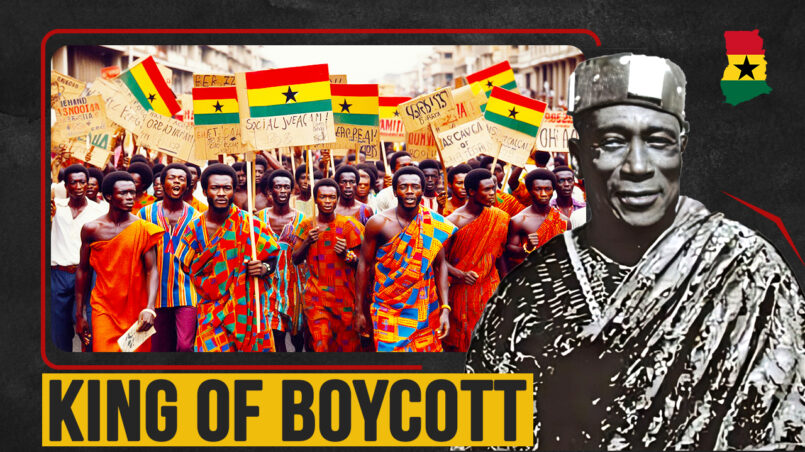Imagine leading a movement so powerful that it shook the foundations of colonial commerce and sparked the flames of independence for an entire nation. Meet the fearless Ghanaian chief who masterminded a historic boycott that forced European merchants to their knees and ignited the fight for Ghana’s freedom.
Nii Kwabena Bonnie III also known as Kwamla Theodore Taylor was a Ghanaian traditional ruler in the Gold Coast now Ghana. He was the Osu Alata Mantsɛ, and the Oyokohene of Techiman. Nii Kwabena Bonnie was born on 26 January 1888. He was a businessman who engaged in the import and export of goods such as cocoa, palm kernels, piassava, fabrics, and many more. He became a very successful merchant and established businesses in the colonial metropolis. He also became the first Gold Coaster to earn the British Royal Couple’s invitation to tour Buckingham Palace in 1925.
Nii Bonnie was a member of the African Merchants’ Association and through his knowledge of trade sought to bring transparency and fairness in the dealings with the 1which was a trade association for European merchants who sold European goods in Gold Coast. Association of West African Merchants was known for its shady and corrupt deals with the indigenes, which gave rise to the Ghanaian word (awam) which means trickery or deception.
Because the colonial rulers had created an economic system heavily dependent on manufactured products from abroad, AWAM had a monopoly over the market. They were accused of conspiring with the colonial government cutting Africans out of both wholesale and retail business. They were also caught in price-fixing and market-sharing agreements restricting import-export trade in Gold Coast
In 1947, Nii formed an Anti-Inflation Campaign Committee in Accra to fight against AWAM who had increased prices of goods steadily during the Second World War and continued to do so even after the end of the war in 1945. The Anti-Inflation Committee was met with widespread support from the Joint Provisional Council, citizens, and traditional rulers around the country.
Nii started negotiations with the Europeans and a letter was sent to The United Africa Company which was a British company that principally traded in West Africa during the 20th century requesting them to lower the prices of goods. He also included in the letter a deadline and a threat to embark on strike action by Ghanaians if demands weren’t met. However, he was ignored. They would not take him seriously because they knew the country needed their goods.
As he waited for a response from the UAC, Nii Bonne traveled throughout the country to promote his plan to boycott European goods. He gained the support of local leaders and citizens in Manya Krobo, Suhum, Akim Oda, Cape Coast, Sekondi, Tarkwa, Axim, and many other regions, who pledged to join the boycott.
On 26 January 1948, the ultimatum expired and the boycott began as planned. The battle cry for the boycott was,” We cannot buy; your price is too high; if you won’t cut down your prices then close down your stores and take away your goods to your own country.” The boycott targeted specific products such as cotton prints, tinned meat, biscuits, and others. While the main focus was on European imported goods, the boycott also extended to goods from other foreign-owned stores, including those owned by Indians and Lebanese.
As a result of the successful organization of the boycott, he became known as “Boycotthene” that is King of Boycott in Akan. The boycott led to the closure of many shops and the government, which had initially stated that it would not interfere, was forced to arrange a meeting between the Chamber of Commerce in Accra and the Anti-Inflation Campaign Committee, as well as the other leaders who had joined the boycott, on February 11, 1948. Nii Bonne’s letter to the United Africa Company was not even forwarded to the company’s head office in London.
On 20 February, an agreement was reached as some of the foreign firms assented to reducing their overall profit margin from 75 to 50 percent. Although many boycotters, and other non-boycotting Ghanaians, rejoiced over this feat, they were disappointed when the prices were not reduced as much as they had anticipated but this would trigger a series of events that would lead to a demand for self-governance and ultimately catalyzed Ghana’s independence.
The boycott occurred simultaneously with a peaceful march to Osu castle by Ghanaian World War II veterans, who were demanding equal pension pay as their British counterparts. The march led to the Riots of 1948, in which three protesters, Sergeant Adjetey, Lance Corporal Attipoe, and Private Odartey-Lamptey were shot dead by the police. This further led to riots by Ghanaians in response to police brutality and Nkrumah, under the leadership of the CPP, began to campaign for Ghana’s independence from British rule.
As a result of the boycott, some students were dismissed from government schools by the British colonial administration for participating in the boycott. The UGCC executive committee responded by establishing an alternative high school for these students who supported Nii Kwabena Bonnie. This ultimately led to the creation of Ghana National College, which was later adopted by Kwame Nkrumah.
He also pioneered several ventures which proved beneficial to the country after the boycott. He continued advocating price reduction on foodstuff and peaceful coexistence between citizens. Nii Bonnie’s successful boycott sparked a wave of nationalism that ultimately led to the granting of independence to the Gold Coast, now Ghana. He played an important role in the nation’s activities and cemented his place as a worthy figure in Ghana’s history.
Nii Kwabena Bonnie III passed away in 1968.
The Osu Traditional Authority, in collaboration with the Osu Heritage Foundation, hosted a symposium on March 14, 2022, in honor of the late Nii Kwabena Bonnie III, to highlight his significant contributions to Ghana’s journey to independence.


